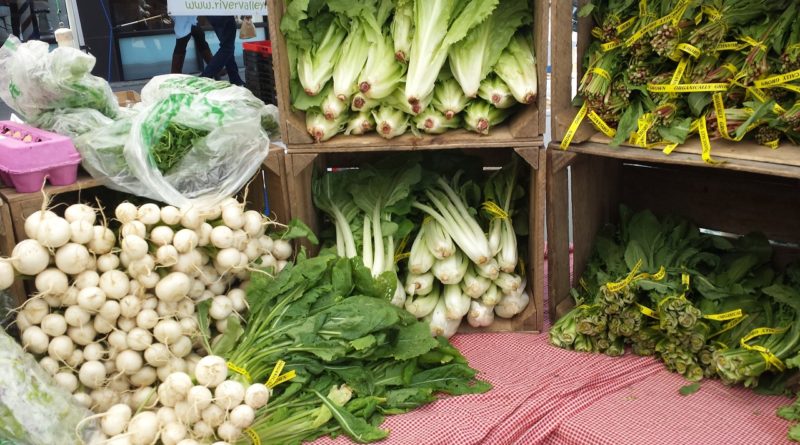Can Farmers Markets Survive COVID-19?
Podcast: Play in new window | Download (Duration: 1:33:10 — 42.4MB)
Subscribe: Apple Podcasts | Spotify | Android | iHeartRadio | Podchaser | Email | TuneIn | RSS | More
(May 17, 2020) Unless you are exquisitely oblivious to the COVID world around you, simple tasks like shopping have become a source of anxiety. Who’s wearing a mask? Who isn’t? What did I touch? Could it be contaminated? Did I remember to bring sanitary wipes? Ah, but there are always farmers markets, right? Open air, easy to maintain social distancing, short food chain. Much safer than conventional grocery stores. But can Farmers Markets Survive the COVID-19 pandemic?
Skip to a specific segment in this podcast.
6:22 Janie Maxwell from the Illinois Farmers Market Association
53:05 Dennis Warnecke of Tanio Biologicals
1:09:44 Sean Ruane from Advocates for Urban Agriculture
1:24:42 Meteorologist Rick DiMaio
Wait, you say. You just explained why farmers markets should be miles ahead of supermarkets. What’s the problem? Here’s the problem during the coronavirus pandemic.
According to a Farmers Market Coalition member survey, 74% of respondents reported decreased income, while 93% report added costs, including the purchase of PPE for market staff, rental of more hand-washing stations, new software or services, and additional staff to rearrange market layouts and monitor customer traffic.
The need to reduce the number of vendors to enforce physical distance requirements, while other vendors are unable to attend markets due to health concerns, age, and labor shortages, points to a steep decline in revenue for market organizations. In a similar survey by the California Alliance of Farmers Markets, nearly 20% of respondents reported concern that they may not survive the economic impacts of COVID-19.
As we have learned the hard way, our food supply chain has simply not been up to the challenge of COVID-19. We’re probably only in the first quarter of what will be a long, painful contest. So we ask, can farmers markets survive this pandemic? And we pose that question in the spirit of urgency, knowing that farmers markets will need to be part of the solution to our food supply woes.
In Illinois, our spring weather has been tentative, and so has the roll out of farmers markets. But the Illinois Farmers Market Association is determined that they will open and that they will be safe. The organization has created an ILFMA COVID-19 Toolkit. Its goal is
to provide farmers markets with resource guidelines for operating an IN and OUT, transaction-based farmers market. The guideline provides best practice recommendations for social distancing and enhanced sanitation.
The toolkit includes
- ILFMA Farmers Market Manager Guide
- ILFMA Vendor Guide
- Booth Signage
- NOT READY FOR USE SIGNAGE
- Volunteer Waiver Form
- ILFMA Updated Customer Guide
Since most of you reading this are customers, and not vendors, here are the guidelines for customers. This was updated on May 12, 2020.
- Wear a mask and follow CDC recommended hygiene practices
- If you’re not feeling well, stay home.
- Maintain the required 6′ distance between yourself, market staff, vendors, and other shoppers.
- This is not a family event. Limit attendance to one member of the household.
- Pre-order products where possible to speed up transaction process.
- Use credit and debit cards and SNAP/Link benefits for purchases.
- If cash is used, do not expect change.
- Do not touch products at vendor stands.
- At home, wash all products thoroughly before using.
And they finish with the best of all possible advice: Be patient and kind – we’re all in this together.
Janie Maxwell, ILFMA Executive Director, was last with us almost two years ago. She joins us this morning.
Treat your soil with kindness
That’s a great way to think about how to grow things. My own phrase is “It’s the biology, stupid.” Okay, when I say that, I’m not calling anybody stupid. It’s just that when it comes to growing things, too many folks forget about the life of the soil. Which is why The Mike Nowak Show with Peggy Malecki is pleased to have a sponsor like Blazing Star, Inc. In their own words,
 Blazing Star believes a common thread underlies the restoration of native ecosystems and the practice of natural and organic agriculture: the health of living soil communities.
Blazing Star believes a common thread underlies the restoration of native ecosystems and the practice of natural and organic agriculture: the health of living soil communities.
The oak trees of the midwest savanna rely on partnership with adapted soil organisms to obtain and convey nutrients. The same is true with crops and living soils. Blazing Star is committed to soil health and agricultural and gardening products sold by Blazing Star must first do no harm.
They also note that they carry soil amendments, foliar fertilizers, enzyme products and compost & stubble treatments from Tainio Biologicals, Inc. for natural agriculture and gardening, many OMRI-listed/CDFA-Registered for organic farming.
When I hear the story of Bruce Tainio, who started his company in 1985, I’m struck by how it has so much in common with other people I’ve come to know in the gardening world in the past twenty years. He became aware that the life of the soil was the key to its health. Unfortunately, that hasn’t been the emphasis of “conventional” agriculture and horticulture systems.
Which brings us to Dennis Warnecke from Tainio, who joins us on the show this morning. Warnecke has been working on the biology of soils since 1985. He writes,
DON’T TREAT YOUR SOIL LIKE DIRT. Soil is a living, breathing thing that not only plants depend on, but all life on earth. Most people regard soil as merely a root anchor and reservoir for chemicals. The organic approach focuses on prevention. Potential problems are headed off by using only those fertilizers and other materials that have positive reactions to the soil eco-system. Great emphasis is placed on the soil and its vitality. Feed the soil first and the plant will feed itself. The end result will be a healthier and more productive plant with a deeper root system.
As far as we know, most of our listeners are gardeners. So you will be interested in the Biogarden™ line of products from Tainio. But there are many other ways to keep your soil alive and productive, and we’ll discuss as many as we can this morning.
COVID-19 Farmer Support Grant, Round 2
One month ago, I received a request from Sean Ruane, the new executive director of Advocates for Urban Agriculture (AUA). He asked if we could help promote a new program called COVID-19 Farmer Support Grants. They were providing small grants of $500-$1,000 to Chicagoland farm businesses who had been impacted by the COVID-19 pandemic.
We managed to squeeze him into a jam-packed show and we wondered if the program would be successful.
Well, we received that answer this week, when Sean asked us if we could have him return to the show to announce the COVID-19 Farmer Support Grant, Round 2. This time, he will have a little breathing room to present the program. Just this week, AUA, Food:Land:Opportunity (FLO), and Slow Food Chicago (SFC) announced the names of 32 Chicagoland farm businesses awarded grants through the first round of the COVID-19 Farmer Support Grant.
At the same time, they announced a 2nd round of funding, which is larger in scope than the first round. It is open to a large network of applicants, including: 1) IL farm businesses whose primary markets are located in Chicagoland communities 2) Community Gardens operating in Chicagoland communities, and 3) Collaborative projects working to create greater access to healthy food in local communities.
Farm businesses will be applying for grants of $2,500 and community gardens will be applying for grants of $1,000. Additionally, up to 5 entities can apply for a $10,000 grant to support a collaborative project that aims to create greater access to locally sourced food in Chicagoland communities.
Sean Ruane joins us again on the show this morning.

